Bangladesh
The overall objective of the project is to improve labour relations and working conditions in accordance with sustainable development objectives . In Bangladesh, the project contributes to the Labour Administration and Working Conditions Cluster (LAWC) in the ILO Country Office for Dhaka (CO Dhaka) which supports the tripartite constituents and relevant stakeholders to reform the labour sector. The project focuses on raising awareness on fundamental Conventions, and promoting responsible business conduct in line with the Tripartite Declaration of Principles concerning Multinational Enterprises and Social Policy (MNE Declaration). It also led technical work related to labour law and ILS under the Advancing Decent Work in Bangladesh Project. This includes providing technical assistance to the government and social partners (tripartite constituents) to apply international labour standards, including labour law reform, and participate in the ILO supervisory mechanism. It works on facilitating a network of labour lawyers and partners with law schools in integrating ILS in labour law curricula.
Bangladesh has demonstrated its commitment to international labour standards by ratifying 36 ILO Conventions, including 8 ILO Fundamental Conventions and the Protocol of 2014 to the Forced Labour Convention, 1930, 2 governance conventions (Conventions No. 81 and 144) and 26 technical conventions. Bangladesh has also ratified the 2014 Protocol to the Forced Labour Convention, 1930, which requires the Government to support due diligence by both the public and private sectors to prevent and respond to risks of forced or compulsory labour.
In 2021, the Government of Bangladesh developed a Roadmap of Actions (Roadmap) to address issues concerning non-observance of the following ILO Conventions: the Freedom of Association and Protection of the Right to Organise Convention, 1948 (No. 87), the Right to Organise and Collective Bargaining Convention, 1949 (No. 98) and the Labour Inspection Convention, 1947 (No. 81). In parallel, Bangladesh adopted the National Action Plan on the Labour Sector of Bangladesh (NAP) which is linked to the Everything but Arms (EBA) Enhanced Engagement with Bangladesh.
In addition, collaboration and support to tripartite constituents and relevant stakeholders has resulted in the implementation of the Roadmap and the NAP, focusing on labour law reform and promoting responsible business conduct in line with the MNE Declaration. To facilitate this, the aim is to support the Ministry of Labour and Employment (MoLE), other relevant ministries, Employer and Business Membership Organizations (EBMOs) and Workers’ Organizations in Bangladesh.

Objective
The contribution to Sustainable Development Goal 8 on promoting inclusive and sustainable economic growth, employment, and decent work for all through improved labour relations and working conditions.
In Bangladesh, the project focused on the following:
- Enhancing awareness and knowledge among tripartite constituents (workers and their organizations, employers’ organizations, and the government) on ILO Fundamental Conventions, in particular the Occupational Safety and Health Convention, 1981 (No. 155) and the Promotional Framework for Occupational Safety and Health Convention, 2006 (No. 187).
- Supporting effective participation of tripartite constituents in national processes to address gaps between national law and practice and international labour standards, in particular ILO Conventions Nos. 155 and 187.
- Facilitating enhanced collaboration and dialogue between constituents, supply chain actors and trade partners to promote responsible business conduct for the realization of decent work in policy and practice.
- Supporting tripartite constituents to effectively fulfil their respective roles in reporting to the ILO supervisory bodies.
Achievements
Significant milestones have been achieved in advancing labour rights and promoting responsible business conduct in Bangladesh. Notably, the ratifications of key international labour conventions were supported, including the Protocol of 2014 to the Forced Labour Convention (Protocol No. 29) and the Minimum Age Convention, 1973 (No. 138), assisting the country to uphold global labour standards.
Vital support was also provided to inform and guide labour law reform processes through technical analyses and dialogues. This resulted in increased technical and political consensus on aligning provisions in the draft amendments of the Bangladesh Labour Act (BLA) with International Labour Standards.
Moreover, stakeholders in Bangladesh have been actively engaged in awareness-raising activities on responsible business conduct, aided by guidance based on actionable insights from research on stakeholder preparedness for responsible business conduct and Human Rights Due Diligence (HRDD).
Additionally, the development of an annual work plan by tripartite constituents and stakeholders for reporting to the Committee of Experts on the Application of Conventions and Recommendations (CEACR) on ratified ILO Conventions was facilitated. This led to constructive dialogues and agreements between the Government of Bangladesh (GoB) and workers’ representatives, addressing CEACR comments effectively.
Furthermore, the establishment of the Trade Unions International Labour Standards Committee (TU ILS Committee) is another achievement resulting from participation in the ILO normative cycle and the promotion of workers’ rights. Through these endeavours, there have been significant contributions made to enhance the labour rights landscape and foster responsible business practices in Bangladesh.
Activities
In Bangladesh, the focus is on the following objectives:
- Supporting the country in implementing ratified ILO Conventions, particularly those covered by the 1998 ILO Declaration on Fundamental Principles and Rights at Work.
- Supporting the labour law reform process to facilitate enhanced alignment with ratified conventions.
- Supporting tripartite constituents to effectively fulfil their respective roles in reporting to the ILO supervisory bodies.
- Supporting constituents in promoting sustainable, responsible, and inclusive business practices in alignment with the Declaration of Tripartite Principles on Multinational Enterprises and Social Policy.
Resources

Guidance / Bangladesh
ILO’s supervisory mechanism, the Article 26 Complaint and the Road map
September 15, 2024

Guidance / Bangladesh
Compilation of selected observations and direct requests of the Committee of Experts on the Application of Conventions and Recommendations: Bangladesh
February 1, 2024

Guidance / Bangladesh
Factsheet No.6_labour inspection
May 1, 2023

Guidance / Bangladesh
Factsheet No. 5 on Technical Note
May 1, 2023

Guidance / Bangladesh
Factsheet No. 4 on Technical Note
May 1, 2023

Guidance / Bangladesh
Factsheet No. 3 on Technical Note
May 1, 2023

Guidance / Bangladesh
Factsheet No. 2 on Technical Note
May 1, 2023

Guidance / Bangladesh
Factsheet No. 1 on Technical Note
May 1, 2023
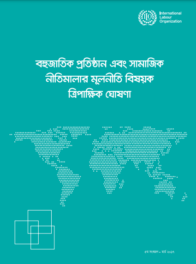
Guidance / Bangladesh
Tripartite Declaration of Principles concerning Multinational Enterprises and Social Policy
September 25, 2022
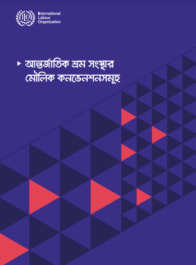
Guidance / Bangladesh
International Labour Organisation’s Fundamental Conventions
September 25, 2022
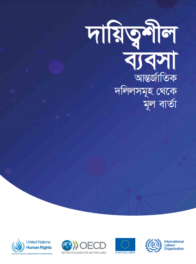
Guidance / Bangladesh
Responsible Business: Messages from Key Instruments
September 25, 2022

Legal / Bangladesh
Governing Body Report June 2021(GB.342/INS/INF/2(Rev.1)- Road map of actions to address all the outstanding issues mentioned in the complaint concerning non-observance by Bangladesh of the Labour Inspection Convention, 1947 (No. 81), Freedom of Association and Protection of the Right to Organise Convention, 1948 (No. 87), and the Right to Organise and Collective Bargaining Convention, 1949 (No. 98)
November 11, 2021

Legal / Bangladesh
National Action Plan (NAP) on the Labour Sector of Bangladesh (2021-2026)
June 1, 2021
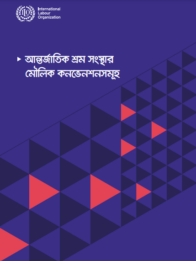
Informative / Bangladesh
Fundamental Principles and Rights at work
September 15, 2024
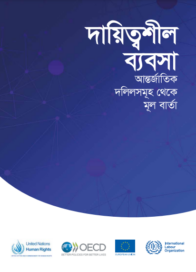
Informative / Bangladesh
Key of Principles
February 17, 2024

News / Bangladesh
Bangladesh government convenes workers’ and employers’ organizations to discuss application of ratified Conventions and implementation of ILO’s expert recommendations
August 21, 2023

News / Bangladesh
European Parliament discusses implementation by Bangladesh of labour reforms
April 20, 2022

News / Bangladesh
Bangladesh ratifies fundamental ILO Convention on child labour
March 22, 2022

News / Bangladesh
Bangladesh ratifies the Minimum Age Convention
March 22, 2022
Fundamental Conventions and selected International Labour Standards and Protocols ratified
Ratification of ILO Conventions
Supporting the Government to submit instruments of ratification for the Protocol of 2014 to the Forced Labour convention, 1930 and the Minimum Age Convention, 1973 (No. 138)
Support was provided to the Ministry of Labour and Employment (MoLE) to submit the instruments of ratification of the Protocol of 2014 to the Forced Labour Convention, 1930 and the Minimum Age Convention, 1973 (No. 138). To achieve this, samples of instruments of ratification were shared and coordination amongst MoLE, the Ministry of Foreign Affairs, and the ILO was facilitated, ensuring the smooth submission of both instruments of ratification. For ILO Convention No. 138, a briefing on the scope of application and exclusion under Convention No.138 was prepared and a meeting was organized between the Country Director, the Labour Secretary, and MoLE’s officials to support the decision-making process on the flexibility clauses under the Convention. Subsequently, the Government was supported in drafting the instrument of ratification. The Protocol was ratified on 20 January 2022 and ILO Convention No. 138 was ratified on 22 March 2022.
Action
- Technical support on preparing the declaration, production of a technical brief for high level consultation, and the instrument of ratification
- Support to submit the instrument of ratification
Results
- Ratification of ILO Convention No. 138 in 2022
- Ratification of the Protocol of 2014 to the Forced Labour Convention in 2022
Enhancing awareness on unratified Conventions, including the Occupational Safety and Health Convention, 1981 (No. 155) and the Promotional Framework for Occupational Safety and Health Convention, 2006 (No. 187)
A series of awareness raising materials were developed and activities undertaken along with an analysis on possible conventions for ratification. This initiative led to the first tripartite consultation on unratified conventions in accordance with the Tripartite Consultation (International Labour Standards) Convention, 1976 (No. 144). The Trade Unions International Labour Standards Committee (TU ILS committee) has committed to include the work on developing a strategy on ratifications within its mandate and has set priorities for the ratifications of specific ILO Conventions.
Action
- Translation of 10 ILO Fundamental Conventions from English to Bangla and the publication of a booklet
- Production of rapid assessments on the compliance of national legislation and policies with ILO Conventions Nos. 155 and 187
- Organization of activities for tripartite constituents and other representatives from Bangladesh to exchange experiences and lessons learnt on international labour standards (ILS) and national labour legislative frameworks with counterparts from Nepal and Viet Nam in light of the upcoming LDC graduation in 2026
- Raising awareness on the promotion pyramid which outlined the ratifications requested by the ILO Governing Body
- Production of a brief on possible conventions for ratification
- Animations to promote ILO Conventions No. 155 and 187 produced
Results
- The Advisory Council (equivalent to the Cabinet) approved proposals to ratify ILO Conventions Nos. 155, 187, and 190 on 24 July 2025. The Government is in the process of submitting the instruments of ratifications to the ILO
- The TU ILS Committee committed to include within its mandate the work on developing a strategy on ILS ratifications
- Tripartite consultation on unratified Conventions was organized for the first time in 2023 with an agreement arrived at between the tripartite constituents to organize further consultations
- The TU ILS Committee prioritised advocating for the ratification of the specific ILO Conventions
Enhancing the implementation of ratified Conventions, including the Minimum Age Convention, 1973 (No. 138) and the Protocol of 2014 to the Forced Labour Convention, 1930
Supporting the Government in identifying gaps between ratified Conventions and national law and practice
Support was provided towards the preparation of the Rapid Assessments on Convention No. 138 and the Protocol to Convention No. 29, which identified gaps in national laws. The results of these rapid assessments were used to inform recommendations aimed at enhancing the alignment of the Bangladesh Labour Act with international labour standards.
Action
- Supporting the preparation of the Rapid Assessments on Convention No. 138 and the Protocol to Convention No.29
Results
- Identification of gaps in national laws which informed the labour law reform process
Constituents effectively participate in national processes that address gaps between national law and practice and targeted conventions
Strengthening national labour laws and enhancing their alignment with international labour standards
Supporting the establishment of the Trade Union’s International Labour Standards Committee (TU ILS Committee/Committee)
Following training and capacity building on international labour standards for representatives of trade unions, the leaders independently decided to establish the TU ILS Committee in 2022. The Committee was formalised in 2024. With technical support, the Committee has actively participated in the ILO normative process, including by submitting observations for two consecutive years (2022-2023). Additionally, the Committee has participated in tripartite consultations on reports to be submitted to the ILO supervisory bodies at the national level and has contributed to the General Survey for the first time in 2023.
Action
- Organization of trainings and workshops on international labour standards (ILS)
- Providing technical support to the TU ILS Committee on ILS, national labour laws and reporting
- Facilitation of the TU ILS Committee prior to its establishment
Results
- Establishment and formalization of the TU ILS Committee
Facilitating the participation of the TU ILS Committee in the labour law reform process
Training and technical assistance were provided to the TU ILS Committee on interpreting the comments of one of the ILO supervisory bodies, specifically the ILO Committee of Experts on the Application of Conventions and Recommendations (CEACR). This support led to the successful preparation of proposals on amendments to the Bangladesh Labour Act, with many proposals addressing CEACR comments.
Action
- Trainings on ILS, including on the comments of the CEACR
Results
- Engagement of the TU ILS Committee in the labour law reform process
- The National Coordination Committee for Workers’ Education (NCCWE) and IndustriAll Bangladesh Council (IBC) submitted proposals on amendments of the Bangladesh Labour Act, many of which addressed CEACR comments
Promoting the integration of comments from the ILO supervisory bodies, particularly the CEACR during the national labour reform process
Supporting the labour reform process through the provision of technical analyses and the facilitation of dialogues
In collaboration with the Ministry of Labour and Employment (MoLE), technical analyses, factsheets and other support documents were produced, while technical sessions and consultations related to labour law reform, including tripartite sessions, were facilitated. These initiatives have fostered increased technical and political consensus in aligning more provisions in the draft amendments of the Bangladesh Labour Act (BLA) with international labour instruments.
Action
- Two versions of a Technical Note have been produced on global best practices for aligning Bangladesh labour laws with selected international labour standards. Each version, released in 2022 and 2023 respectively, is complemented by summary factsheets
- Rapid Assessments have been conducted on ILO Conventions Nos. 155, 187, 138, and Protocol 29. These assessments aim to pinpoint legal issues critical for labour law reform considerations
- A preliminary assessment was completed in 2023 to evaluate the potential impact and effectiveness of the draft amendment to the Bangladesh Labour Act 2006
- Draft texts of amendments to the Bangladesh Labour Act which is aligned with ILS prepared as per request of MoLE. This includes explanation and options for consideration of the Government
- Facilitation of technical sessions and consultations, including tripartite, related to labour law reform
Results
- Increased technical and political consensus in aligning provisions in the draft amendments of the Bangladesh Labour Act with international labour standards
- Constituents effectively participate in national processes addressing gaps between national law and practice and targeted conventions
Enhanced collaboration and dialogues between constituents, supply chain actors and trade partners to prompt responsible business conduct in policy and practice
Promotion of the Tripartite Declaration of Principles for Multinational Enterprises (MNE Declaration)
Raising awareness and capacity building on Responsible Business Conduct (RBC) and Human Rights Due Diligence (HRDD)
Awareness raising materials related to RBC were produced and disseminated, and the Bangladesh Business and Human Rights Week was co-hosted with the UNDP. Additionally, trainings were provided on RBC, HRDD and forced labour, which bolstered the capacity of stakeholders to further train the members of their respective organizations and their colleagues.
Action
- Development and dissemination of materials related to RBC, including translations of the MNE Declaration and key messages
- Organization of awareness raising activities on RBC and HRDD for the realization of decent work
- Trainings for trainers on RBC and HRDD, attended by representatives of the Government, workers’ organizations and Employer and Business Membership Organizations (EBMOs), especially from the agro-processing and leather sectors
- Tripartite consultation on MNE Declaration was organized in Dhaka
Results
- Strengthened the awareness of the stakeholders on RBC
- Enhanced the ability of representatives of the government, workers’ organizations and EBMOs to provide trainings on RBC and HRDD
- Increased interest of constituents in appointing a National Focal Point in accordance with the conclusions of the Tripartite Consultations
Development of a Technical Tool on Responsible Business Conduct
Supporting action-oriented research to guide dialogues and promote RBC and HRDD for the realization of decent work
A study on the preparedness of stakeholders in Bangladesh for HRDD laws was conducted. This action-oriented research was designed to simultaneously examine and address issues while collaborating with stakeholders to co-create knowledge. The preliminary findings of the study were shared with stakeholders for consultations, and the final draft was validated in October 2023. The study yielded seven recommendations which were reaffirmed, further refined, and prioritized by stakeholders based on their potential impact and other considerations. The validation workshop resulted in a roadmap outlining the steps forward on RBC and HRDD for the realization of decent work in Bangladesh.
Action
- Research was conducted on the preparedness of stakeholders in Bangladesh for RBC and HRDD
- A series of data collection sessions and consultations on the results of the research were organized
Results
- Refinement and prioritization of the study’s recommendations by relevant stakeholders to inform dialogue and the steps forward on RBC and HRDD for the realization of decent work in Bangladesh
Tripartite constituents effectively fulfil their respective roles in reporting to the supervisory bodies
Strengthening the ability of the Government to meet its reporting obligations on ratified international labour conventions
Supporting the government in preparing reports to the ILO supervisory bodies
Training and technical assistance were provided to tripartite constituents, leading to the endorsement of the annual workplan developed by the tripartite constituents in 2022 by the Ministry of Labour and Employment (MoLE). The workplan aimed to prepare reports on ratified ILO Conventions to the ILO supervisory bodies, particularly the ILO Committee of Experts on the Application of Conventions and Recommendations (CEACR). Subsequently, this workplan was implemented in 2023, resulting in the Government submitting reports on time and with improved quality both in 2022 and 2023. In 2023, the MoLE received support to organize the first tripartite consultation on reports to be submitted to the CEACR in accordance with ILO Convention No. 144, the Tripartite Consultation (International Labour Standards) Convention, 1976 (No. 144). This consultation led to concrete agreements between the Government and Workers’ representatives to address some comments of the CEACR. Additionally, the Ministry of Shipping organized the first tripartite consultation in the maritime sector in line with ILO Convention No.144 for reports on Conventions Nos. 27, 32 and 185. Furthermore, support was provided to the Trade Unions International Labour Standards Committee (TU ILS Committee) to prepare and submit observations on ratified conventions in 2022 and 2023, as well as for the General Survey in 2023. In 2025, the Project, in cooperation with the Advance Decent Work for Bangladesh Project, provided technical assistance to the Government, workers and employers organizations in preparing reports due in 2025. The Government established the Tripartite Committee on ILS which has a mandate to lead the consultation as required by ILO Convention No. 144. Following the establishment, the project and the ADWB supported capacity building of the members to operationalize the committee. The project and the ADWB also supported labour law lecturers in assisting the worker organizations in understanding CEACR comments and preparing observations. The Bangladesh Employer Organization also organized consultation with its members to utilize information in preparing its observations.
Action
- Provision of training on international labour standards and reporting to raise awareness, identify challenges and corrective measures and prepare the draft reports to the ILO supervisory bodies
- Technical support in developing the annual workplan on reporting
- Supporting the MoLE and the TU ILS Committee in understanding the ILO supervisory mechanisms and the comments made by the CEACR through technical review
Results
- The annual work plan developed by tripartite constituents in 2022 ensured the timely submission of reports with improved quality in 2023
- The TU ILS Committee prepared and submitted reports on ratified conventions (2022 and 2023) and contributed to the General Survey (2023)
- MoLE organized the first tripartite consultation prior to reporting in accordance with ILO Convention No 144. The consultation resulted in concrete agreements between the Government of Bangladesh and workers’ representatives regarding recommendations made by the CEACR
- The Ministry of Shipping organized the first tripartite consultation in the maritime sector in accordance with ILO Convention No.144
- Establishment of the Tripartite Committee on ILS with a mandate to lead tripartite consultations on items required under ILO Convention No. 144